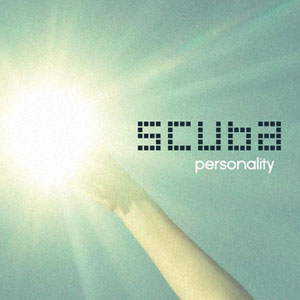Scuba Personality
About two weeks ago, Paul Rose (a.k.a. Scuba) released his latest single, “The Hope.” Considered […]

About two weeks ago, Paul Rose (a.k.a. Scuba) released his latest single, “The Hope.” Considered a teaser for his forthcoming third studio album, Personality, the single painted a picture of a man edging ever closer to big-room commercial appeal. Yet, unlike the smartly hybridized trance of previous single “Adrenalin,” “The Hope” sounded like an over-the-top attempt at co-opting the bravado of late-’90s big-beat acts like The Prodigy and Crystal Method. The track wasn’t without its guilty charms, but fans of the producer’s more subtle material—the likes of which he built his name on—were understandably wary of what kind of album such a move might signal.
Thankfully, Personality isn’t Paul Rose’s The Fat of the Land, though it does stray closer to the sonic palette of “The Hope” than anything else in his discography. In practical terms, this means that the new LP is Scuba’s most dancefloor-centric effort to date. Undoubtedly spurred by a his stints at Berghain and time spent DJing around the world, Personality bleeds the color of contemporary European club culture. Rose has taken on the role of a stylistic wanderer, and although his willingness to experiment and take chances is noble, his problem at this point isn’t experimentalism so much as quality control and a willingness to reign in excess.
Case in point is album opener “Ignition Key,” which starts things on an off-kilter note with Rose delivering a spoken-word performance worthy of Tyler Durden. This monologue drawls out over a loose collage of disturbing noises before fading into an upbeat track that draws from the same ’80s freestyle and synth-pop references that informed “Adrenalin” b-side “Everywhere.” Different though, is the way in which “Ignition Key” pumps out of the speakers. Once it gets going, it’s obvious that this is an album mastered with festivals and Berlin-sized stacks of Funktion-One speakers in mind.
From there, Personality eases into “Underbelly,” a slow burner that sounds like an attempt to apply a body-centric techno approach to the dubwise atmospherics that defined Scuba’s second LP, Triangulation. It’s one of the record’s most subdued moments, with distant chimes and swirling washes of noise tethered down by the human touch of a shuffling cafe jazz band. It’s one of the easiest songs on the album to digest and represents the first showing of a subtler vein that runs through the record.
In stark contrast is aforementioned single “The Hope.” Brash and ballsy, it’s just over four minutes of abrasive rave sirens layered over crashing, big-beat-style drums. Complimenting the barrage is more spoken word, with Rose offering tabloid-worthy quotes in the same deadpan that began the LP. It would be too much, but just as soon as you catch yourself thinking, “he can’t be serious,” the track dives into a strikingly euphoric piano-stab breakdown that harkens back to the glory days of raving. Yet, as divisive as it is, there’s no denying that “The Hope” will likely find its place as one of the year’s most audacious club cuts; it’s the sort of thing that will invariably be picked up and played by the same circuit of big-name DJs that championed “Adrenalin.”
Only three tracks in, Rose has quickly established two currents in opposition to one another. As the album continues to unfold, these two extremes are visited with very little middle ground. “Dsy Chn” takes a straightforward breakbeat, throws it under evolving vocal calls, and invokes ambient music through an array of sparsely arranged floating pads, while “July” lifts the mood with a return to the upbeat ’80s pilfering of the album opener. “Action” gets aggro by jumping headfirst into Ostgut Ton-style dub-techno, “Cognitive Dissonance” is a take on jungle that offers an incongruous moment spent at 170 bpm with The Winstons, and “Gekko” brings it full circle with a crunchy slice of trance-inducing, four-on-the-floor K-hole psychedelia.
This leads into “NE1BUTU,” the album’s peak moment. Dropping with a helium-voiced “Never seen you break it down like this,” it plays like the underground antidote to the commercial bombast of “The Hope.” The sonic equivalent of six double-stacked Mitsubishis, it’s as unbridled and wild as anything released in ’92, complete with a rush of deadstock rave pianos, stuttering leads, and faceless orgasming divas. It’s over all too soon, yet somehow in its short 4:40 it manages to compress and convey the spirit of a moment that has since moved into timelessness.
After some quality time spent in the chillout room with “Tulips,” Rose completes the album on the high note of “If U Want.” Building on a hypnotic, two-note bassline, the emotional—but still upbeat—track rides a sparse rhythm before being joined by a smear of cascading melodies and pleading voices. It all ends in a beatless haze with a reversed short snippet of Rose’s voice providing a final point of punctuation. Once the smoke clears, you can’t help but be feel a little confused. Amidst all the diversions and stylistic variation, there’s never a moment where the whole thing comes together. Instead, Personality is less a cohesive statement than a scattered reflection of the experimental process that’s come to define Scuba’s output in the new decade.

